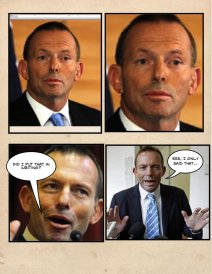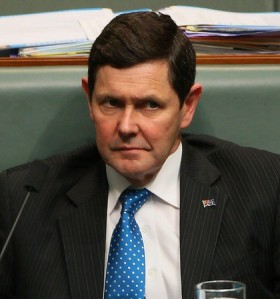“Nothing Is Free… except speech, we have free speech.”
‘In a recent speech, he (Mr Hockey) said the PBS, which
cost $9 billion in 2013, was one of the largest contributors to health
spending growth over the past decade, along with Medicare, the private
health insurance rebate and public hospital funding to state
governments.
His comments suggested the government was considering cutting
back on the subsidies of medicines for concession card holders, who he
said accounted for 80 per cent of PBS expenditure.
“Much of the money spent on the PBS is accessed by a small cohort
of people. In 2012-13, 10 per cent of patients accounted for 58 per
cent of PBS expenditure,” he said.’
“The Saturday Paper”
In what a source alleges is a leaked copy of the Audit Committee that
has just been given to me, there are some very interesting notes. I
cannot vouch for the veracity of the copy, but as much of the news these
days consists of printing unsubstantiated rumours and the rest consists
of reporting the opinions of billionaires, talkback hosts and make-up
artists, I figured I’d go ahead and share it with you in spite of the
fact that the word “Audit” was misspelt and the font used was Comic Sans.
When I ran it past a colleague and said that it surely it was a fake,
he reminded me that Tony Abbott was Prime Minister, Christopher Pyne was
Education Minister, Lord Monckton is trotted out as someone who knows
what he’s talking about and that people got very angry about the Mining
Tax potentially taking money from Gina Rinehart, so how could anyone be
sure of what was real?
So from nearly two pages, I found the following conclusions from the Audit Committee of interest:
- Most of the Health Budget is spent on sick people. Healthy people
hardly get to access any of it. Something must be done to redress this
imbalance. - Women were the responsible for over 99% of gynecological services.
- A $6 co-payment for people attending a doctor was only reasonable.
People who couldn’t afford $6 would not be required to pay as they
probably can’t the public transport costs to get to the doctor anyhow. - The cost of administering 457 visas is prohibitive, so firms could
be trusted to bring in foreign workers without any government oversight. - People on a Disability Pension have lower incomes than most workers. Taking them off the Disability Insurance may fix this.
- People with a degree expected to be paid more than the minimum wage.
Making higher education less accessible would drive down wages,
boosting profits and productivity. - With less need for people to go on to Higher Education, any
recommendations from the Gonski report about increasing funding to
public schools could be ignored. - Aboriginal people have the vote now, so it’s time we stopped funding
them separately, so any organisation or body with the words
“Indigenous” or “Aboriginal” should have their funding withdrawn. - Legal Aid just keeps people out of jail, and therefore encourages
crime. As people without a lawyer are likely to go to be convicted
anyway, they may as well just be given a sentence without a trial,
saving millions in court costs. - Money spent locking up asylum seeker in detention must be except
from any audit, and nobody on the Audit Committee has any conflict of
interest in saying this. - In the area of news, ABC is duplicating many things that the private
media organisations are doing. We encourage them to keep this up.
However, we may have to reconsider this if they report things that
aren’t in Australia’s interests such as reports from the IPCC or any
statements from Cory Bernardi. Anything, in fact, that makes the
Government look bad because that’s just un-Australian. - The Direct Action policy on Climate Change where the government
gives money to polluters to stop will be much more effective than
collecting money via the Carbon Tax. However, policing the scheme to
check if they actually do reduce pollution would be expensive, so we can
save money by just trusting them.
Like I said, I have some doubts about the truth of this, but since when did truth have anything to do with politics?













